Act! and Salesforce are two products that offer their customers the power to manage their customer relationships with data. But, which one is right for your organization? If you’re a small to midsize business needing a CRM with built-in marketing automation, Act! is a great solution for you. However, if you’re a larger business seeking advanced features like in-depth reporting and AI tools, Salesforce would be a great fit for you.
SEE: Explore TechRepublic Premium’s software usage policy.
Act! vs. Salesforce: Comparison table
| Feature | Act! | Salesforce |
|---|---|---|
| Contact and lead management | Yes | Yes |
| Deal and pipeline management | Yes | Yes |
| Marketing automation | Basic | Advanced |
| Reporting and analytics | Yes | Yes |
| Integrations | 70+ | 4,000+ |
| Mobile app | Yes | Yes |
| Starting price (billed annually) | $30 per user per month | $25 per user per month |
| Free trial | 14 days | 30 days |
| Visit Act! | Visit Salesforce Customer 360 |
Act! vs. Salesforce: Pricing
Act! pricing*
- Act! Premium Cloud: $30 to $40 per user per month.
- Act! Premium Desktop (on-premises): $37.50 per user per month.
Act! add-ons:
- AMA (advanced marketing automation): $79 to $399 per account per month.
- Act! Support (enhanced support): $10 per user per month.
*Pricing is based on annual subscriptions.
Salesforce Sales Cloud pricing*
- Starter Suite: $25 per user per month.
- Professional: $80 per user per month.
- Enterprise: $165 per user per month.
- Unlimited: $330 per user per month.
- Einstein 1 Sales: $500 per user per month.
Salesforce add-ons:
- Sales dialer: Starts at $5 per user per month.
- Partner Relationship Management: $25 per member per month, or $10 per login per month.
- Social Intelligence: $25 per user per month.
- Territory Planning: $75 per user per month.
*Pricing is based on annual subscriptions.
Act! vs. Salesforce: Feature comparison
Contact and lead management
Winner: Salesforce
When it comes to basic customer relationship management, the Act! vs. Salesforce CRM fight is a close one. Both CRMs allow you to efficiently manage and track customer information, track tasks and activities, and communicate with customers.
Salesforce, however, wins in this category with its additional tools for contact and lead management. These include automatic lead routing and Einstein Capture, which automatically captures and syncs activities to your Salesforce contact and calendar, eliminating the need to manually log activities.
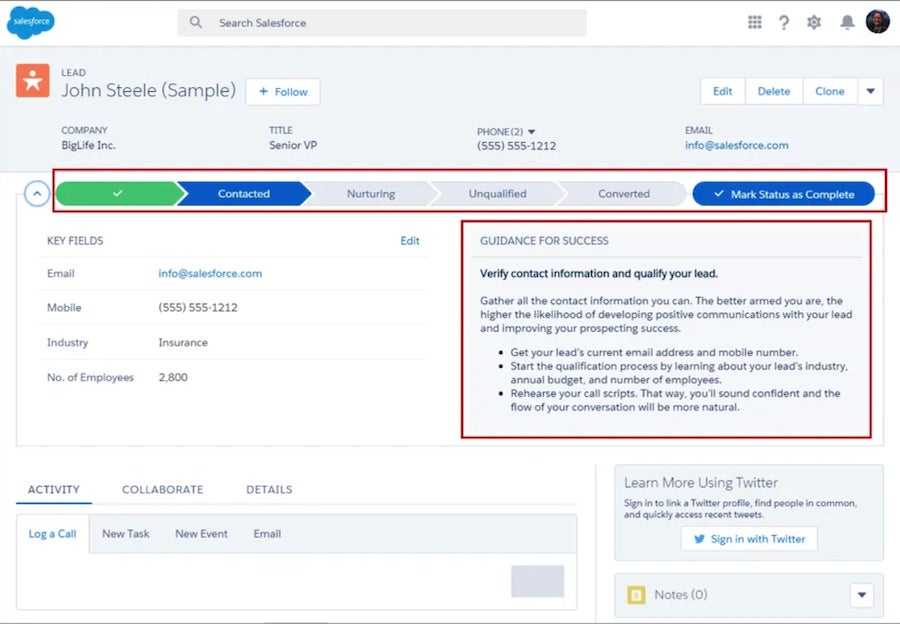
Deal and pipeline management
Winner: Salesforce
Act! is equipped with basic tools for opportunity management and sales pipeline management. You can capture key opportunity details and manage deals using a customized sales process. It also allows you to associate products and pricing to specific deals, get a visual representation of your sales pipeline and move deals to another pipeline stage using a simple kanban board.
Salesforce, on the other hand, offers a lot more deal and pipeline management features on top of the ones available in Act!. Users can assign reps to collaborate on a deal, get a complete view of sales meeting details and communicate with colleagues using an internal feed called Chatter. Higher tiers also offer opportunity scoring, deal insights, case management and tools for managing contracts, quotes, and orders.
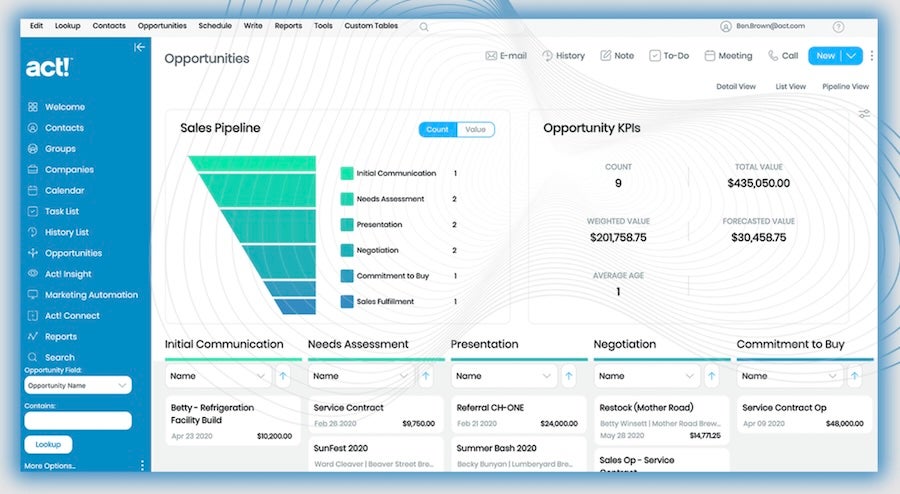
Marketing automation
Winner: Act!
When comparing Act! and Salesforce, we focused on the features that are included in the basic CRM packages. For starters, Act! gives you more value for your money if you want a CRM with built-in marketing automation features. Its CRM plan gives you access to its email marketing feature, email templates, interactive template editor, email metrics, visual workflow designer for drip marketing and campaign calendar. You can add advanced tools like social sharing, landing pages, surveys and A/B testing starting at $79 per user per month.
Meanwhile, Salesforce Sales Cloud offers mass email, web-to-lead capture, email templates, email management and email tracking across all plans. You’ll have to subscribe to its Marketing Cloud Engagement plan (starting at $400 per organization per month) if you want advanced tools like personalized emails, content creation, audience segmentation and A/B testing.
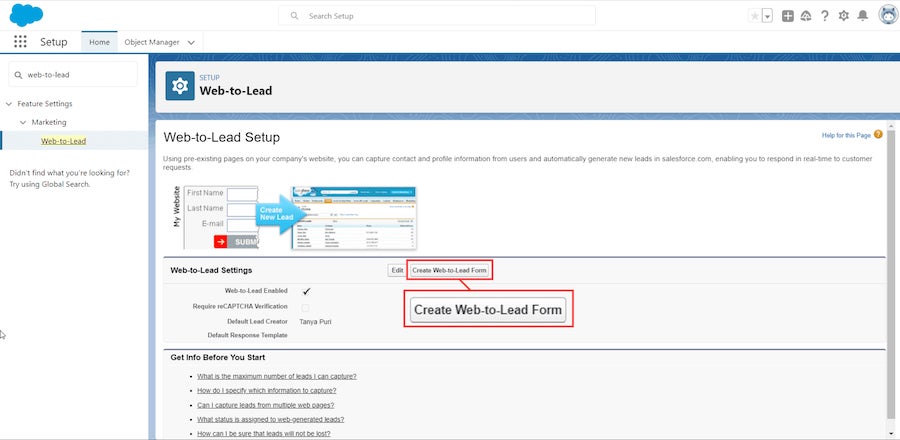
Reporting and analytics
Winner: Salesforce
If you want a CRM with robust reporting and analytics features, Salesforce is definitely the choice for you. With Act!, you can access over 80 out-of-the box reports, including contact lists, activity reports and sales performance metrics. It also provides you with actionable insights into individual and team performance, as well as sales, marketing and business health metrics.
Salesforce takes reporting and analytics to a different level with advanced features like smart forecasting, customizable reports and dashboards, history tracking and cross filters. You can also use its opportunity splits to track the total effort of your sales team and accurately divide commissions based on individual effort.
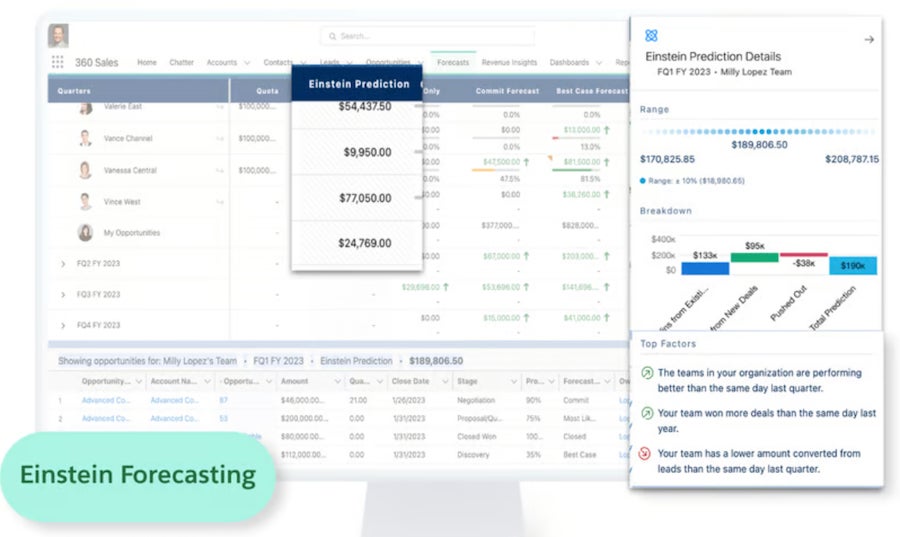
Integrations
Winner: Salesforce
When it comes to integrations, the winner is pretty clear. Act! has over 70 integration options, mostly via Zapier. Salesforce, on the other hand, has over 4,000 integrations available on its AppExchange marketplace, not including the over 6,000 integrations via Zapier.
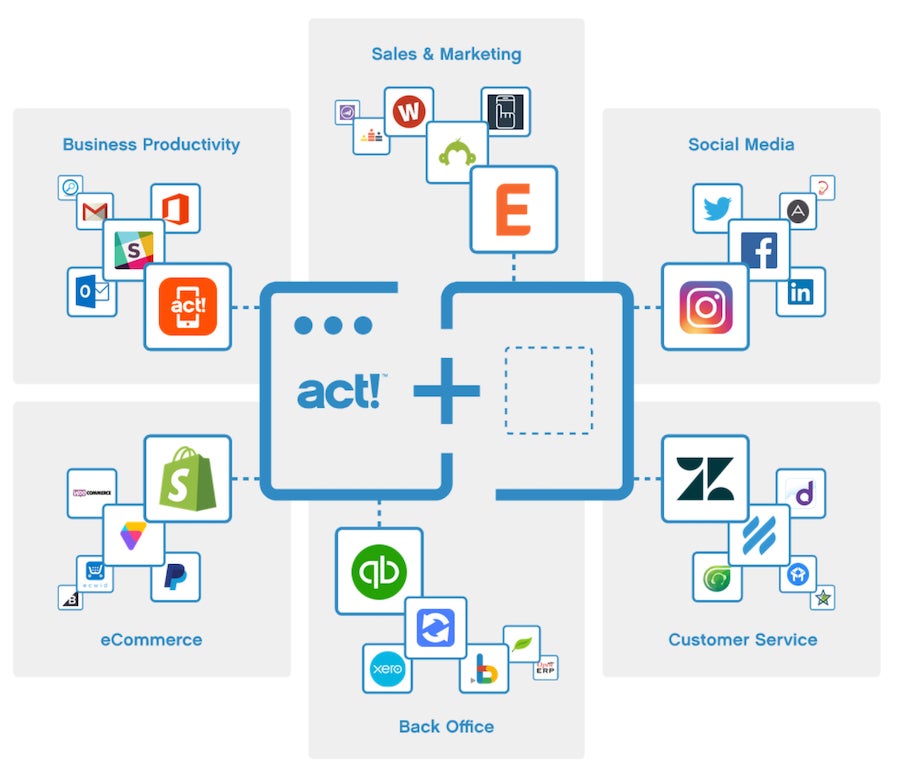
Mobile app
Winner: Salesforce
The Act! Companion, which is the native mobile app of Act!, allows you to access contact and company details, interactive maps, calendars, activities and interaction history on the go. You can also create, update and close deals from the app, as well as view real-time metrics on its insight dashboards.
Salesforce is known for its excellent mobile app, which has all of the features available on its desktop version. You can access your personalized dashboard and CRM data, as well as receive real-time notifications on workflow changes. It also has built-in enterprise-grade security that protects your CRM data. Plus, it has AI capabilities that include a smart voice assistant and analytics.
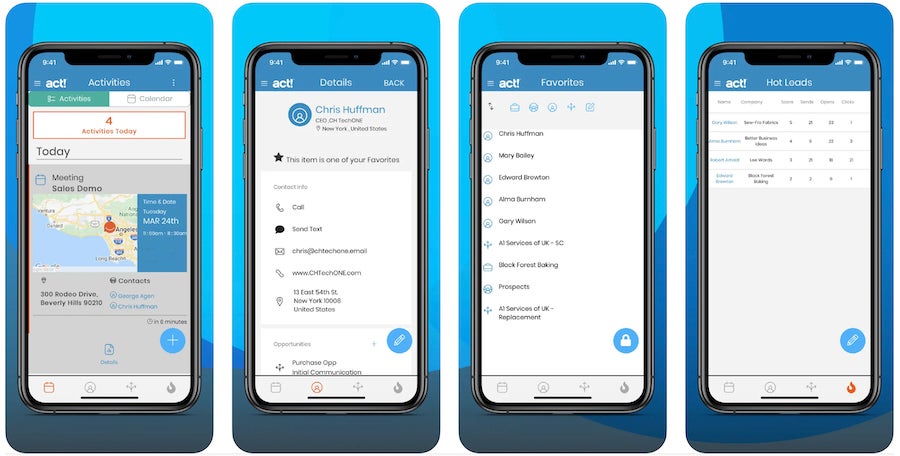
Act! pros and cons
Pros
- Fully customizable sales pipelines.
- Offline sync to ensure continued productivity whether online or offline.
- Easy to access, set up and launch.
- Highly effective features and processes for small and midsize businesses.
- Optimized sales and marketing processes.
Cons
- Users have complained of a non-intuitive user interface.
- Frequent crashes have been reported by a few users.
- Offers on-premises deployment.
Salesforce pros and cons
Pros
- Customer-centric automation.
- Has an ecosystem that goes beyond the CRM system.
- AppExchange marketplace has thousands of applications for installation and integration.
- Versatility allows it to be tailored to numerous business needs.
- Self-service and self-education portals to reduce reliance on customer support.
Cons
- Reliance on internet connection.
- Over-customization can lead to a clunky and ineffective implementation of Salesforce.
How to choose between Act! and Salesforce
Act! is an effective choice if your business falls under the small and midsize category. Its capabilities will suit businesses that are looking to improve their marketing processes, lead management, sales opportunities and customer activities.
On the other hand, Salesforce proves to be a great choice for companies of all sizes looking to take advantage of vast integration options as well as an ecosystem that goes beyond CRM. If automation and AI products and capabilities matter to your organization’s CRM, then Salesforce is worth considering.
Review methodology
We evaluated these Salesforce and Act! based on several criteria, such as pricing, free trials or demos and billing options. We also looked at their core and niche CRM features, like lead and deal management, marketing automation, reporting and analytics, integrations and mobility. In addition, we considered the quality and cost of the software’s customer support.
Our references for these details include the providers’ online resources, demo videos and blogs. Aside from that, whenever possible, we sign up for free trials to get a personal feel for their interface. We also supplement this information with actual user ratings from reputable review sites like G2, Capterra, Google Play and the App Store.

